Rocket Pool (RPL)
Rocket Pool is a decentralized Ethereum staking platform. As of October 2022, the protocol has more than 292,736 Ether staked with approximately 1,659 node operators and a Total Value Locked (TVL) of $650.11 million.
Overview
Rocket Pool provides two staking methods: Ethereum staking and running a node, and just staking. Running a node requires a minimum of 16 ETH, while staking requires as little as 0.01 ETH. The platform's smart contracts have been audited by Sigma Prime, Consensys Diligence, Trail of Bits, and Immunefi Bug Bounty.
Staking and running a node
Ethereum holders can stake and run a node with Rocket Pool. This approach allows stakers to earn both ETH rewards and variable RPL token rewards for providing RPL collateral. The solution is permissionless, allowing node operation with 16 Ethereum, which is half the amount needed for solo staking.

| Ticker | RPL |
| Category | Business Services |
| Website | https://www.rocketpool.net |
| @Rocket_Pool | |
| https://www.reddit.com/r/rocketpool | |
| Contract Addresses | |
|---|---|
| ethereum | 0xd3...1f Copied! Copied! |
| arbitrum-one | 0xb7...07 Copied! Copied! |
| polygon-pos | 0x72...ec Copied! Copied! |
Staking
Rocket Pool allows Ethereum holders to stake with as little as 0.01 ETH. When holders deposit ETH, they receive the rETH liquid staking token, which accrues staking rewards over time. The solution is decentralized, where a network of node operators earns rewards for rETH holders. It is also non-custodial as node operators do not handle funds, and any penalties are deducted from their earnings.
RPL token
RPL is Rocket Pool's native token with a total supply of 18 million. It supports the system's trustless and decentralized nature and facilitates community governance. Operators who stake RPL receive additional rewards, and new RPL tokens are minted every 28 days in a process called "checkpoint." This token ensures system integrity and incentivizes node operation.
rETH
Rocket Pool ETH (rETH) is the protocol's liquid staking token. It represents an amount of ETH being staked and earning rewards within Ethereum's Proof-of-Stake system. As node operators stake, the value of rETH relative to ETH increases due to the rewards.
Launch
Rocket Pool launched on the Ethereum mainnet in November 2021, initially as part of the Beacon Chain. It later became compatible with Ethereum's Proof-of-Stake infrastructure after The Merge. Initially, Rocket Pool registered 237 node operators globally, with 1,088 ETH staked within the first two days.
Mainnet rollout
The mainnet launch was a staged rollout to gradually increase the protocol’s staked value. This rollout occurred in four phases, limiting the number of minipools and the size of the rETH deposit pool in each phase.
Redstone
Redstone is the Rocket Pool release that includes compatibility with The Merge. The release of Redstone smart nodes and smart contracts occurred before the Ethereum Merge.
Priority fee distributor
Post-Merge, node operators receive priority fees (tips) for block creation. This distributor ensures these fees are shared between node operators and rETH users.
Rewards system
Previously, node operators needed to stake RPL as insurance, with rewards given every 28 days. After The Merge, they must make an on-chain claim every 28 days, with gas fees depending on network activity.
Smoothing pool
The Smoothing Pool is an opt-in feature that pools priority fees from participating members, reducing the randomness associated with block proposals.
Protocol DAO (PDAO)
The Rocket Pool Protocol DAO manages various settings across the protocol through RPL governance. It can propose governance changes, manage treasury spending, and adjust protocol settings. In phase 0, the PDAO has limited on-chain power, with the Core Team implementing its decisions.
Oracle DAO (ODAO)
The Oracle DAO consists of special nodes that relay information from the Beacon Chain to Rocket Pool's smart contracts. It operates as a decentralized network within the protocol, with members able to propose new memberships and earn RPL.
Launch members
The initial members of the Oracle DAO include Lighthouse, Nimbus, Prysmatic Labs, Etherscan & Beaconscan, and others, contributing to its decentralized operations.
Team
- David Rugendyke - Founder & CTO
- Darren Langley - General Manager
- Kane Wallmann - Senior Solidity Engineer
- Nick Doherty - Senior Blockchain Engineer
- Joe Clapis - Senior Blockchain Engineer
- Maverick (Nick Ashley) - Marketing & Community Manager
